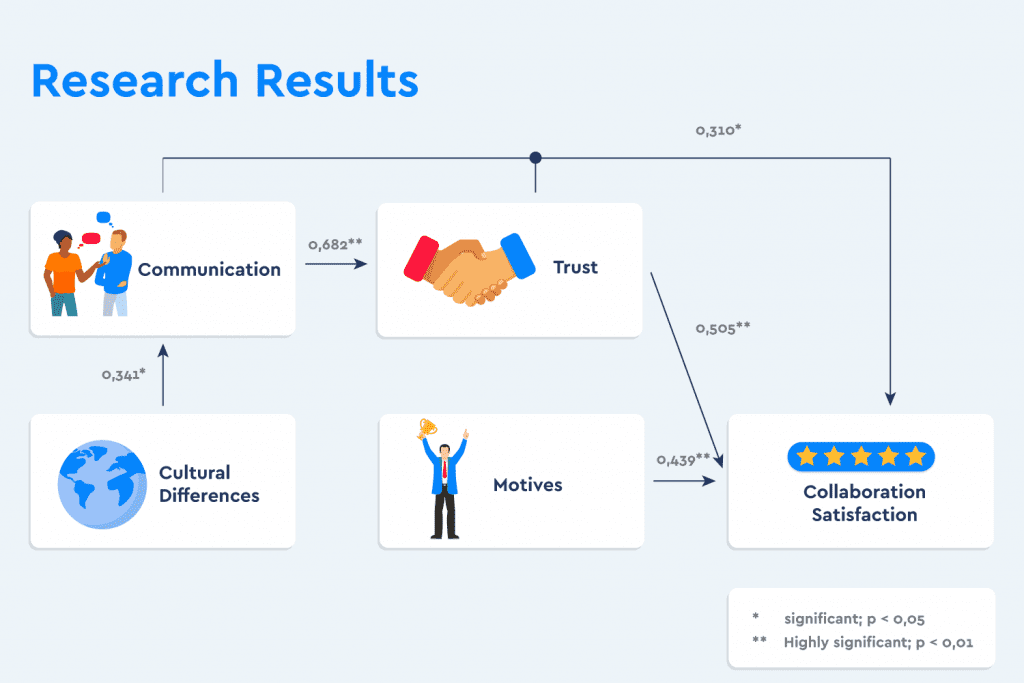David and Goliath
Corporations and startups seem like complementary collaboration partners. Corporations are experts in executing ideas, while startups generate innovative ideas. In the last decade collaborations between those two actors vastly increased. However, even though specific programs (e.g. Corporate Incubators or Accelerators) were implemented, those collaborations often fail to deliver or succeed [1]. Research in this field is still scarce and mostly based on qualitative methods like case studies and interviews. By creating a survey with the help of adjusted scales from interorganizational collaboration research, this study generated generalizable results. Thereby, this article brings some light to the darkness of research regarding corporate startup collaborations. Additionally, the results are transformed to 10 practical tips for a successful collaboration.
Research Approach
To examine the topic a survey with 54 startups, mainly from Austria and Germany, was conducted. Each participant represented one startup. As an objective to answer the survey questions, startups should have related to their most important collaboration or, if that was for some reason not possible, an average of their overall perception. The specific demographics are shown in Figure 1.
Based on collaboration theory literature, four key factors for collaborations were identified. Those were, trust, communication, cultural differences, and collaboration motives. Since collaboration theory is mostly focusing on alliances between established companies, those factors had to be adjusted to the specific case of corporate startup collaborations. The factor motive consisted of four sub-motives: strategy, network, financial and knowledge. Those focused on different goals which are shown in Figure 2.
The perceived satisfaction of the collaboration was used as a dependent variable. Previous research has shown satisfaction as a strong indicator for the success of a collaboration [2].
Results
After conducting a multiple linear regression analysis, the results shown in Figure 3 could be noted. Trust was found to have a highly significant positive impact on collaboration satisfaction. Collaboration motives overall also had a highly significant positive impact. Consequently, startups who perceived high levels of trust achieved high levels of satisfaction, as well as those with strong motives for the collaboration.

Communication showed to positively influence trust and indirectly collaboration satisfaction. Consequently, the better the communication with corporations were perceived, the higher were levels of trust. Cultural differences were not found to have a direct impact on collaboration satisfaction, but on communication. From those and additional findings through open-ended questions, the following ten practical tips could be extracted.
10 Tips for Corporate Startup Collaborations
- Start with small projects to build trust
In simple terms: if you distrust your partner, it is either a sign or a precursor for a failing collaboration. Since trust is mutual, it can often only be developed over time and joint projects. Another possibility would be to make use of already established contacts in the founders’ network.
- Establish defined contact person
Several startups mentioned issues with a clearly defined contact person on the corporation’s site. This leads to longer response times and progressively to more frustration. By defining one responsible employee, some issues regarding communication can be solved.
- Try to avoid in-depth cultural differences
Cultural differences are unavoidable in collaborations between startups and corporations. However, if they reach layers of basic management practices and morality, it hampers communication and trust. For a successful collaboration some common ground is needed.
- Create new processes
Startups get in touch with various processes of the corporation in collaborations. Problems occur in purchase processes as well as in those regarding contacting. Since startups generally have a different purpose than business units. It makes sense to establish parallel processes with less control points and quicker decision making.
- Align collaboration motives and be transparent
Motives are the driving force behind goals [3]. By being transparent about both, corporations and startups can develop increased trust and, in some cases, adjust their collaboration goals.
- Consider network gains
The results showed that startups with strong motives of increasing their network, had a significantly high collaboration satisfaction. However, corporations can increase their network through the startups, too. Often startups launch in niche markets and can therefore provide excellent expertise and contact to specialist suppliers which might be useful for the corporate as well.
- Look out for “greenwashing” and “showing off”
Other studies already mentioned the phenomenon of greenwashing by corporations regarding collaboration programs like accelerators or incubators. Therefore, corporations only use ties to startups as a PR method for being received trendy. The results of this survey additionally show a similar phenomenon from the startups perspective where the corporations’ name is only used to gain market credibility.
- Startups maturity and program affiliation have no effect
Neither startups size, age, amount of investment or sales showed a significant impact on collaboration satisfaction. Moreover, startups within a collaboration program did also not diver to startups in unstructured collaborations.
- Geographical Distance can be neglected
This research did not show a negative effect on collaboration satisfaction for a longer distance between the startup and the corporation. In the digital era corporations and startups seem to be able to collaborate across countries.
- Set stages for long-term collaborations
Many participants mentioned the intention to establish a long-term collaboration. Research also shows increasingly positive effects of collaborations with time. However, the continuance of a collaboration is in itself a sign for success [4]. Developing a plan for the short-, middle- and long-term helps sharpening the focus and may help through times of frustration.
Communicate Trust with the right concepts
When startups and corporates communicate it creates a bond of trust. When using words, Neuro Flash can provide you with a set of guidelines. Here you see a selection of key concepts that are associated with both startups and corporates and can lead to that important feeling of trust. Highlight the importance of investing in a successful partnership.
Get more concepts and words to communicate trust, or do your own search using the Neuro Flash App.




















